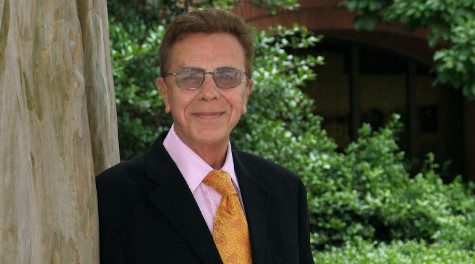William Van Alstyne, former professor at the Marshall-Wythe School of Law Studies and a premier constitutional law scholar often cited in the U.S. Supreme Court, died Tuesday, Jan. 29, at his home in Huntington Beach, California. Marshall-Wythe School of Law Studies Dean Davison Douglas confirmed his death with a campus-wide message Friday, Feb. 1. The cause of death was heart failure.
“Bill was truly one of the great figures in American law, and a beloved member of the William & Mary community for many years,” Davison said in his message.
“Bill was truly one of the great figures in American law, and a beloved member of the William & Mary community for many years,” Davison said in his message.
After 39 years teaching at Duke University as the William R. and Thomas L. Perkins Professor of Law, Van Alstyne joined the Law School’s faculty in 2004. He taught at the university as the Lee Professor of Law until 2012.
Early life and career
Van Alstyne was born Feb. 8, 1934 in Chico, California to Richard and Margaret Van Alstyne. He went on to earn his bachelor’s degree in philosophy from the University of Southern California and his juris doctor degree from Stanford Law School in 1958.
His first job in academia was at Ohio State University. Just three years after being hired, he was named a full professor. During this time, he also worked with Supreme Court Justice Ruth Bader Ginsburg at the Civil Liberties Union, advocating on behalf of the Equal Rights Amendment.
He joined the faculty at Duke in 1965, where he stayed until coming to the College of William and Mary in 2004.
His numerous career accolades include serving as a Fulbright Fellow in Chile, a Senior Fellow at Yale and as a visiting faculty member at multiple law schools including the University of California, Berkeley, the University of Chicago, the University of Michigan, the University of Pennsylvania and Stanford University. He served on the American Civil Liberties Union’s Board of Directors, was the president of the American Association of University Professors, and chaired the Association of American Law School’s Committee on Academic Freedom.
“Bill was a glittering addition to the faculty and a dear friend, in whose marvelous company and vast knowledge I delighted during his time at William & Mary,” former Law School Dean and College President Taylor Reveley said in a press statement.
“Bill was a glittering addition to the faculty and a dear friend, in whose marvelous company and vast knowledge I delighted during his time at William & Mary,” former Law School Dean and College President Taylor Reveley said in a press statement. “He was a brilliant and eloquent scholar who was graced with a marvelous wit and vibrant presence.”
Impact on constitutional law
Reveley noted two distinctions of Van Alstyne. He was twice chosen as being among those most qualified for appointment to the Supreme Court. In 2000, he was also among the top 40 most frequently cited legal scholars.
Institute of Bill of Rights Law Director and law professor Neal Devins said that Van Alstyne’s particular methodology set him apart from other scholars. Devins said that while he was in law school, he looked to Van Alstyne’s work to understand the curriculum.
“He was very interested in the language and words of the Constitution and that of Court Opinions,” Devins said in a press statement. “… When I was a junior law professor, Bill wrote me encouraging notes about my scholarship. Having one of the most respected law professors in the country take note of your work was a real shot in the arm to a fledgling academic. And when Bill joined the William & Mary law faculty, his continued commitment to excellence served as a beacon – a reminder of how fantastic and emerging the academic life can be. Something to strive for and something I remember now that I am more than 30 years into my own career.”
Van Alstyne defended a wide variety of constitutional positions. He advocated for gun ownership and abortion rights, was a registered Republican and served on the ACLU’s Board of Directors. He maintained that the gerrymandering of congressional districts was equivalent to “separate but equal” policies, and he supported a broad definition of the First Amendment.
“[I consider] his teaching and scholarship to be the highest standard of achievement and an inspiration for me as a law professor today,” law professor and former student of Van Alstyne Linda Malone said in a press statement.
“[I consider] his teaching and scholarship to be the highest standard of achievement and an inspiration for me as a law professor today,” law professor and former student of Van Alstyne Linda Malone said in a press statement. “I doubt I would have ever considered being a law professor if I had not had his example and support in my legal career.”
Van Alstyne is survived by many friends and family members including his wife, former law professor Lan Cao; their daughter Harlan Van Cao; three children, Allyn, Lisa and Marshall Van Alstyne from his first marriage; and two grandchildren.

